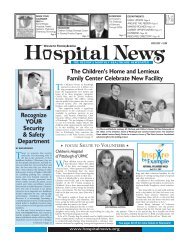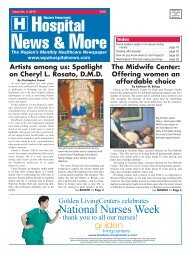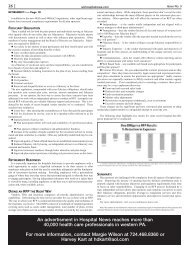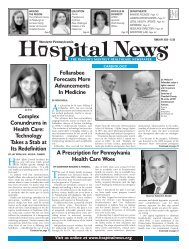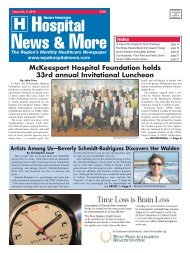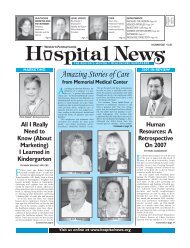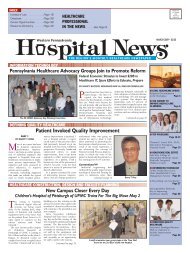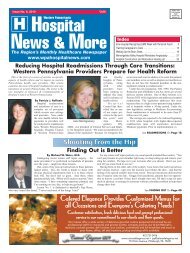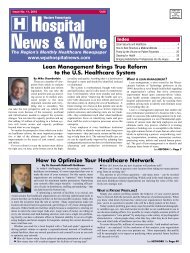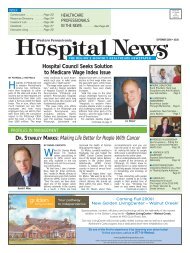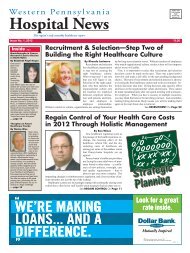Hospital News, 10-1-2011 - Western Pennsylvania Healthcare News
Hospital News, 10-1-2011 - Western Pennsylvania Healthcare News
Hospital News, 10-1-2011 - Western Pennsylvania Healthcare News
You also want an ePaper? Increase the reach of your titles
YUMPU automatically turns print PDFs into web optimized ePapers that Google loves.
<strong>10</strong> | wphospitalnews.comIssue No. <strong>10</strong>Ron Miller—Moving Forward and Finding A New NormalBy Daniel CasciatoEveryone has their own special way of moving on following the loss of a lovedone. For Pittsburgh resident Ron Miller, 67, staying active has helped him discoverhis new normal following the loss of his wife of 35 years, who passed away in May2003. As president of Administrative Resources, Inc., a holding company and halfowner of Amerinet, a large group purchasing organization for healthcare facilities,Miller occupies hisdays and some nightsby continuing to workfull time.“While living in St.Louis, my job at thetime required a fairamount of travel so Iwas gone a lot and didn’tspend much time atmy home there,” recallsMiller. “No matterwhat you do—whether it’s work or ahobby—it’s importantto stay active. Themore you can do to occupyyour time, thebetter it is.”Miller and his wife,the parents of twodaughters and grandparentsto four grandchildren,had movedRon Millerfrom Pittsburgh to St.Louis about the sametime she became ill.“Pittsburghers don’t like to move out of Pittsburgh—it was kind of an oddity forus as well,” says Miller. “So we always looked at this as a temporary move andwanted to move back to Pittsburgh eventually. We rented a house for a year beforewe decided to build. Once we did, we wanted to make the most of it. St. Louis is alot like Pittsburgh, culturally and sports-wise. People are very friendly and joiningThe Hope Bible Church helped with the transition.”Miller called his wife an inspiration to himself and to others.“She was always very encouraging and pushed me,” says Miller. “She had a lotmore faith in me than I did at times—encouraging me to go back to school and earnmy degree, and then my masters degree after that. She was the person who motivatedme the most.”His wife’s illness progressed and she passed away in St. Louis. During this difficulttime in his life, Miller’s family and their friends provided comfort.“But it’s a lot like when you lose a job—your friends move on to deal withtheir own life issues and you are left pretty much on your own to cope with theloss,” says Miller. “It’s just a natural progression. Misery doesn’t really attractcompany and people tend to shy away. But we also weren’t living in St. Louis forthat long before she passed, so our circle of friends was small. The church was abig support for both of us during her illness and then to me as I dealt with herloss.”His wife’s death didn’t stop Ron in his tracks although at times he felt it might.While they had a long and successful marriage, he wanted to continue to live lifeto the fullest.“It’s easy to get depressed and dwell on things you can’t change, but you haveto try to motivate yourself and move on,” he says.In fact, four years ago, Miller took his oldest grandson, who was <strong>10</strong> years old atthe time, on a <strong>10</strong>-day trip to places neither had been in the United States.“My grandson flew in by himself to St. Louis and then we flew to Las Vegas tospend a night there and onto the Hoover Dam; over the next several days we drovemore than 1200 miles through Nevada, Utah, Arizona, Wyoming and toured severalnational parks including Yellowstone, Canyonlands and Arches,” says Miller, addingthat they also visited the Grand Canyon via a train ride from Williams, Arizona.“Most of the things that we did were things that I had never done,” he says. “Sothat was exciting for both of us. I’m planning a similar trip right now with my 9-year old grandson who is excited to take the journey after hearing so much about itfrom his older brother.”To stay active and so he could spend even more time with his daughters andgrandchildren, Miller decided to move back to Pittsburgh three years ago. If hishealth allows for it, Miller says he hopes to also take a cross-country trip with histwo youngest grandchildren who are currently seven and four years old respectively,when they also turn <strong>10</strong>.“We’ll see what happens!” he says.To learn more about Ron Miller’s business, visit www.amerinet-gpo.com.By Nick JacobsThe poverty level statistics came out a few weeks ago,and things haven’t been this bad since 1993. Look to yourleft; look to your right. About one in every six of us is nowconsidered to be living below the poverty level. In 1993,the average new house was $113,000, the average incomewas $31,230, the average car was $13K and tuition at Harvardwas at $23,500. By 20<strong>10</strong> you could nearly doubleevery one of those numbers except the average family incomewhich was only $50,000. (Instead of the $62,500 itshould have been.)One of my favorite comparisons has always been thatHarvard’s tuition was right around $40,000 and the cost to keep a prisoner in jailfor one year is about $45,000. If you extrapolate the number of people in prisonsbased on the entire population of the United States, it works out to about one inevery 31 adults. Between 2.3 million and 2.4 million Americans are behind bars.America incarcerates nine times more people than Germany and 12 times morepeople than Japan. That adds up to nearly $<strong>10</strong>4 billion dollars a year in U.S. prisoncosts alone.The folks on Wall Street and in Washington D.C. who so cunningly helped toput us into this financial mess are, by and large, NOT in prison, and the percentageof prisoners that are minorities is staggering. An estimated sixty-eight percent ofprison inmates were members of racial or ethnic minority groups. Are our prisonsfull because our minorities are bad people, or are they full because their jobless rateis 40% higher than that of Caucasians?We’re also spending about $700 billion on defense with the rest of the worldcombined spending nearly that same number. At $1.4 trillion a year, that adds upto $236 per capita worldwide on defense, and we still have 24,000 nuclear missileslying around; enough to blow up the planet plenty of times.According to the World Bank, over 1 billion people live in conditions of extremepoverty and 15-20 million people are starving every year. I saw anotherOne in Sixset of figures today regarding food subsidies in the United States. It wasn’t afigure indicating our generosity toward these one billion poor people, it was thatbetween 1995 and 20<strong>10</strong>, our Congress voted to provide $260 billion to continueagricultural subsidies. Okay, maybe some of that makes sense, but what aboutthe $17 billion that is going to subsidize ingredients that eventually become hydrogenatedfats.We are an obese country and we continue to finance high fructose corn syrupand hydrogenated fats so that our obesity, diabetes and heart disease epidemics goon uninterrupted. Or is this about some really BIG businesses with some reallygood lobbyists?Maybe it’s time to look at things a little differently? We all know that testosteronetmakes us physically strong, but it also makes us more aggressive and competitive.This testosterone overload has continued to result in war and violence beingaccepted as the normal way to settle things, and, except for the economic benefitsof war, we also know that war is just crazy!We’ve seen time after time that if you are brutal and retaliatory with people, theywill learn to hate and fear you. If you give people love, compassion and respectthey will eventually return the compliment. Maybe we should take a break fromall of this running the world stuff and focus on doing the best that we can for theHUMAN race. Maybe we should walk the talk of our religious leaders for achange.We ran a hospital like that for over a decade and it prospered and grew. Thisconcept is neither rocket science nor brain surgery. It’s the most uncommon ofthings in our current culture, common sense. We cannot change the human condition– but we can change the condition under which humans live and work!”Nick Jacobs, international director for SunStone Consulting, LLC, is known as aninnovator and advocate for patient centered care. With 22 years in health care management,he is author of the health care book,”Taking the Hell out of <strong>Healthcare</strong>”and the humor book, “You Hold Em. I’ll Bite Em.” Read his blog athealinghospitals.com.



